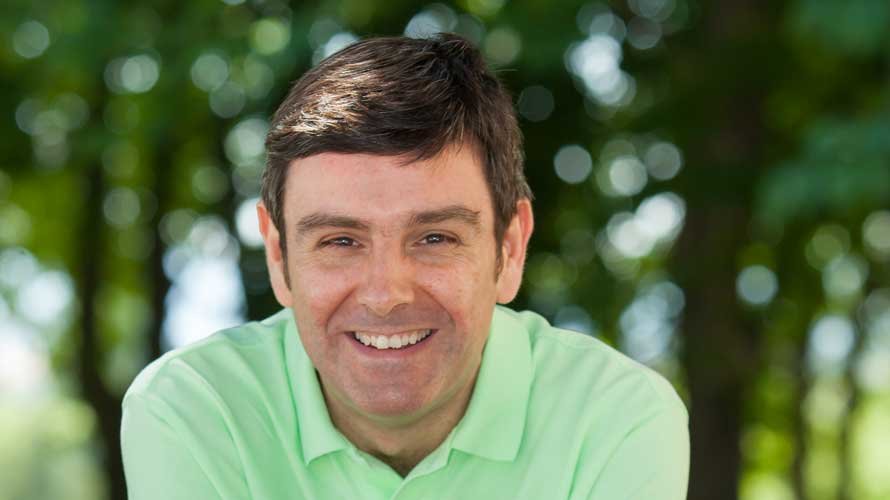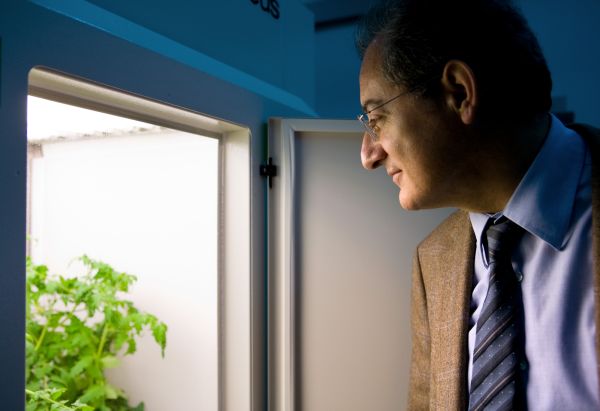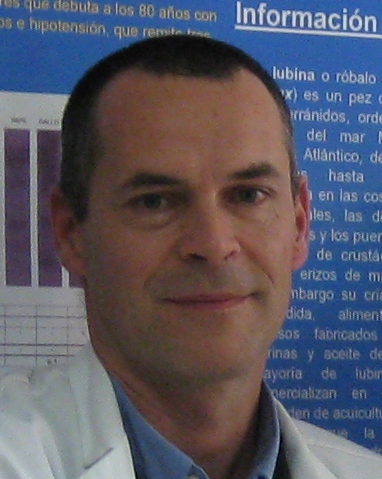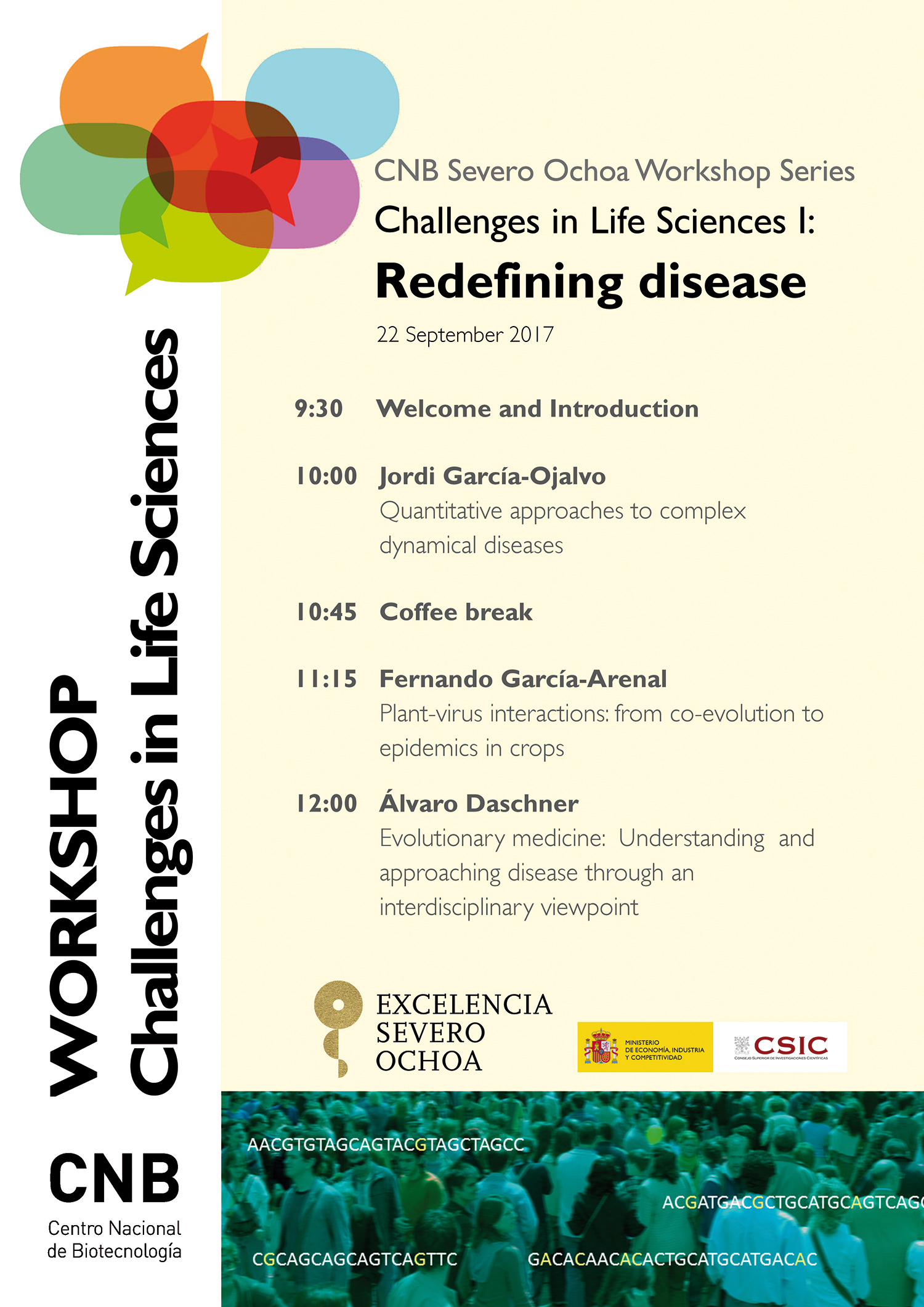
Challenges in Life Sciences I: Redefining disease
September 22, 2017
We live in paradoxical times. The techniques available to probe the structure and dynamics of living systems on many different scales –from molecules to ecosystems, from nanoseconds to evolutionary innovations—are unprecedented, as is the amount of information available. In an era that calls for integrative approaches, we run the risk of losing ourselves in the details, while important scientific questions might be buried under masses of data. Stop for a second: it could prove valuable to step back, look at the big picture from different angles, using a variety of lenses. The premise of the forthcoming Challenges in Life Sciences Series is that these challenges are collective endeavors that will benefit from analyses, concepts, techniques and viewpoints born of different disciplines. Let us transcend borders, be bold and plural.
The CNB is undertaking a series of one-day events that address overall questions in the life sciences. These issues require contributions from distinct fields, as a group of respected speakers will demonstrate in their talks. Join us!
Organizer
- Susanna Manrubia
Scientific Committee
- Domingo F. Barber
- Andrea Chini
- Francisco José Iborra
- Peter Klatt
- Daniel López
- Marta Nieto
- Carlos Óscar Sorzano
- Enrique Rojo
- Miguel Vicente
- Karel van Wely

Programme: Challenges in Life Sciences I: Redefining disease
| 9:30 | Welcome and Introduction |
| 10:00 |
Jordi García-Ojalvo Quantitative approaches to complex dynamical diseases |
| 10:45 | Coffee break |
| 11:15 |
Fernando García-Arenal Plant-virus interactions: from co-evolution to epidemics in crops |
| 12:00 |
Álvaro Daschner Evolutionary medicine: Understanding and approaching disease through an interdisciplinary viewpoint |

Speakers
Talk title: Quantitative approaches to complex dynamical diseases
Speaker: Jordi Garcia-Ojalvo
 Scientific interests: I am interested in studying the dynamics of living systems, from unicellular organisms to human beings. In particular, my lab uses dynamic phenomena to identify the molecular mechanisms of a variety of biological processes such as cellular decision-making, spatial self-organization, and tissue homeostasis. We utilize experimental biochemical and electrophysiological data to constrain computational models of living systems, with the ultimate goal of unraveling the underlying molecular circuitry of physiological processes. Using a combination of theoretical modelling and experimental tools including time-lapse fluorescence microscopy and microfluidics, we investigate dynamical phenomena such as pulses and oscillations, and study their role in the cellular regulatory processes that underlie both health and disease. At a larger level of organization, we use conductance-based neural models to explain the emergence of collective rhythms in cortical networks, and mesoscopic neural-mass models to link the structural properties of brain networks with their function.
Scientific interests: I am interested in studying the dynamics of living systems, from unicellular organisms to human beings. In particular, my lab uses dynamic phenomena to identify the molecular mechanisms of a variety of biological processes such as cellular decision-making, spatial self-organization, and tissue homeostasis. We utilize experimental biochemical and electrophysiological data to constrain computational models of living systems, with the ultimate goal of unraveling the underlying molecular circuitry of physiological processes. Using a combination of theoretical modelling and experimental tools including time-lapse fluorescence microscopy and microfluidics, we investigate dynamical phenomena such as pulses and oscillations, and study their role in the cellular regulatory processes that underlie both health and disease. At a larger level of organization, we use conductance-based neural models to explain the emergence of collective rhythms in cortical networks, and mesoscopic neural-mass models to link the structural properties of brain networks with their function.
Biographical profile: Jordi Garcia-Ojalvo obtained his PhD in statistical physics at the University of Barcelona in 1995. He did postdoctoral work at the Georgia Institute of Technology in Atlanta in 1996, working on laser dynamics, and at the Humboldt University of Berlin in 1998 as an Alexander von Humboldt Fellow, studying noise effects in excitable media. He was IGERT Visiting Professor at Cornell University in Ithaca, New York in 2003, at which time he began working in the field of systems biology. In 2008 he became full professor at the Universitat Politècnica de Catalunya, where he had been teaching applied physics since 1991. He is Visiting Research Associate in Biology at the California Institute of Technology since 2006, and joined the Universitat Pompeu Fabra as full professor of Systems Biology in 2012.
Talk title: Plant-virus interactions: from co-evolution to epidemics in crops
Speaker: Fernando García-Arenal
 Scientific interests: Our long-term research goal is understanding the emergence of new viral diseases. Plant viral diseases affect food security, crop and forest productivity, and the composition and dynamics of natural ecosystems. The highest socio-economic impact of infectious diseases is often caused by emerging diseases, i.e., those whose incidence is increasing in a new host population. Major factors that favour disease emergence are changes in host ecology and environment, and genetic change in pathogen and host populations.
Scientific interests: Our long-term research goal is understanding the emergence of new viral diseases. Plant viral diseases affect food security, crop and forest productivity, and the composition and dynamics of natural ecosystems. The highest socio-economic impact of infectious diseases is often caused by emerging diseases, i.e., those whose incidence is increasing in a new host population. Major factors that favour disease emergence are changes in host ecology and environment, and genetic change in pathogen and host populations.
Over the years, interests and contributions of the group have included all aspects of plant virology, from diagnosis and diagnostic tools for new diseases to the molecular mechanisms of plant-virus interactions. However, a major and continuous interest in the group’s history has been understanding plant virus evolution, and important contributions have been made on the characterisation of the genetic variability of plant viruses, on the analysis of the genetic structure of their populations and of the factors that shape it, on the mechanisms that generate genetic variability in RNA and DNA viruses, and on the evolution of pathogenicity and virulence. The estimation of relevant evolutionary parameters has been used to develop realistic models of virus emergence. This research has contributed significantly to advancing knowledge of virus evolution. In the last few years, his interests have included the analysis of the evolution of plant virus interactions in wild and agricultural ecosystems, and of the ecological factors that favour virus emergence. These questions are approached using different host-virus systems, including crops, model species and wild plants in natural ecosystems.
Biographical profile: Fernando García-Arenal obtained his PhD degree in Plant Pathology in 1977. He has been a visiting scientist at Cornell University (Ithaca, New York, USA) and at the University of California San Diego (USA). Since 1983 he is full professor at UPM, Madrid, Spain, and currently leads the research group “Plant-Virus Interactions and Co-Evolution” at Centro de Biotecnología y Genómica de Plantas UPM-INIA, of which he was Director from 2006 to 2015. He is or has been member of the editorial boards of prestigious scientific journals such as Virology, Journal of General Virology, Molecular Plant-Microbe Interactions, Archives of Virology, Journal of Virology, Virus Evolution and Proceedings of the Royal Society B. His group is an international reference in the fields of virus evolution, plant-virus co-evolution and plant virus emergence.
F. García-Arenal has been PI of 16 research grants funded by various Spanish competitive programmes, of four grants (Spanish team) funded by different Framework Programmes of the European Union, and of two Marie Curie mobility programmes, as well as 12 research contracts with the private sector or public institutions. He is author of more than 120 publications in scientific journals, publishing regularly in the most respected journals of the area of virology as well as in journals with a broader scope.
Talk title: Evolutionary medicine: Understanding and approaching disease through an interdisciplinary viewpoint
Speaker: Álvaro Daschner
 Scientific interests: Although progress and knowledge in medicine is indisputable, there are many disorders in daily clinical practice whose etiological or pathogenic bases are complex and difficult to address in research; this can lead to a reduction in therapeutic possibilities. As an allergist, I observe important progress and knowledge in molecular biology that can explain or diagnose certain specific allergies, although this knowledge does not help clarify the origin of disease, the patient's susceptibility to adverse immunological reactions or the increase in the prevalence of these diseases in our westernized population. A multidisciplinary approach necessarily involves knowledge of biology, especially ecology or evolutionary theory. In this way, we will be able to explain the vulnerability of our species or of certain populations to diseases, the existence of symptoms which now appear exaggerated, whereas they evolved to be advantageous in another context. Using this pluri-disciplinary approach, we are now able to postulate the Hygiene Hypothesis or Microbiota Hypothesis as an explanation for the appearance of many chronic inflammatory disorders in modern societies.
Scientific interests: Although progress and knowledge in medicine is indisputable, there are many disorders in daily clinical practice whose etiological or pathogenic bases are complex and difficult to address in research; this can lead to a reduction in therapeutic possibilities. As an allergist, I observe important progress and knowledge in molecular biology that can explain or diagnose certain specific allergies, although this knowledge does not help clarify the origin of disease, the patient's susceptibility to adverse immunological reactions or the increase in the prevalence of these diseases in our westernized population. A multidisciplinary approach necessarily involves knowledge of biology, especially ecology or evolutionary theory. In this way, we will be able to explain the vulnerability of our species or of certain populations to diseases, the existence of symptoms which now appear exaggerated, whereas they evolved to be advantageous in another context. Using this pluri-disciplinary approach, we are now able to postulate the Hygiene Hypothesis or Microbiota Hypothesis as an explanation for the appearance of many chronic inflammatory disorders in modern societies.
Biographical profile: Álvaro Daschner is Doctor of Medicine and specialist in allergology. He completed his doctoral thesis at the Pediatric University Hospital of Freiburg (Germany). He carries out his professional activity in the Allergy Service of the Health Research Institute of the University Hospital La Princesa in Madrid. He is currently a member of the Scientific Committee of the Spanish Agency for Food Safety and Nutrition (AECOSAN). He teaches in the Master's degree programs in Immunology Research and in Microbiology and Parasitology at the Universidad Complutense of Madrid.
He has published more than 40 articles in scientific journals and a dozen books or book chapters. He is a coordinator of the MedEvo platform that organizes the Multidisciplinary Seminars and Seminars in Evolutionary Medicine since 2009, with the publication of three books. His research field comprises (allergic) disease associated with anisakis sensitization, food allergies, chronic urticaria and evolutionary medicine.







